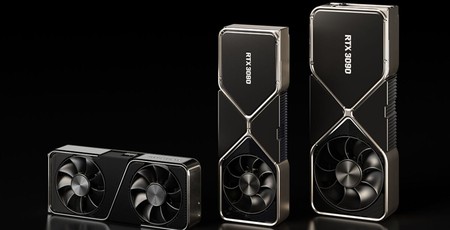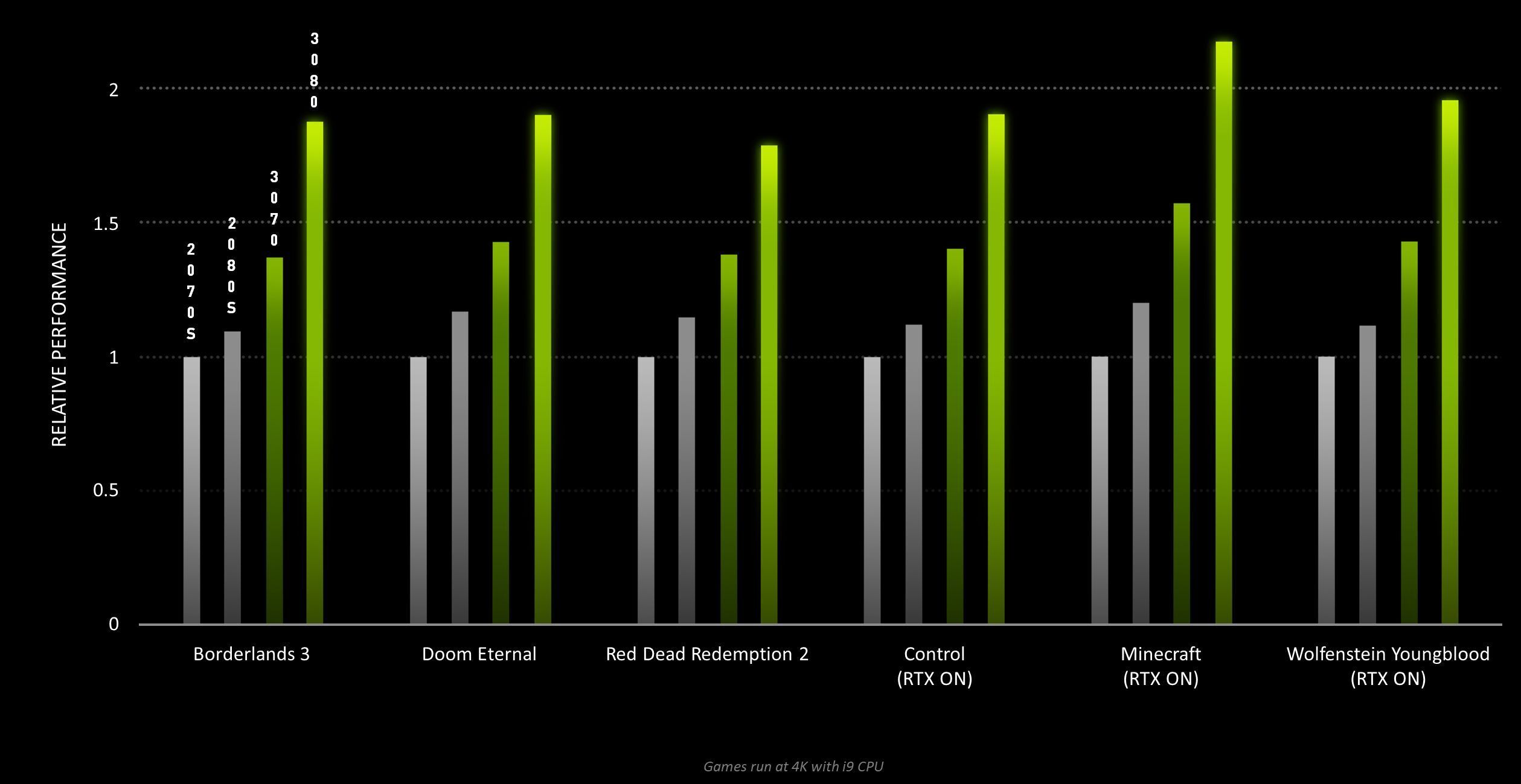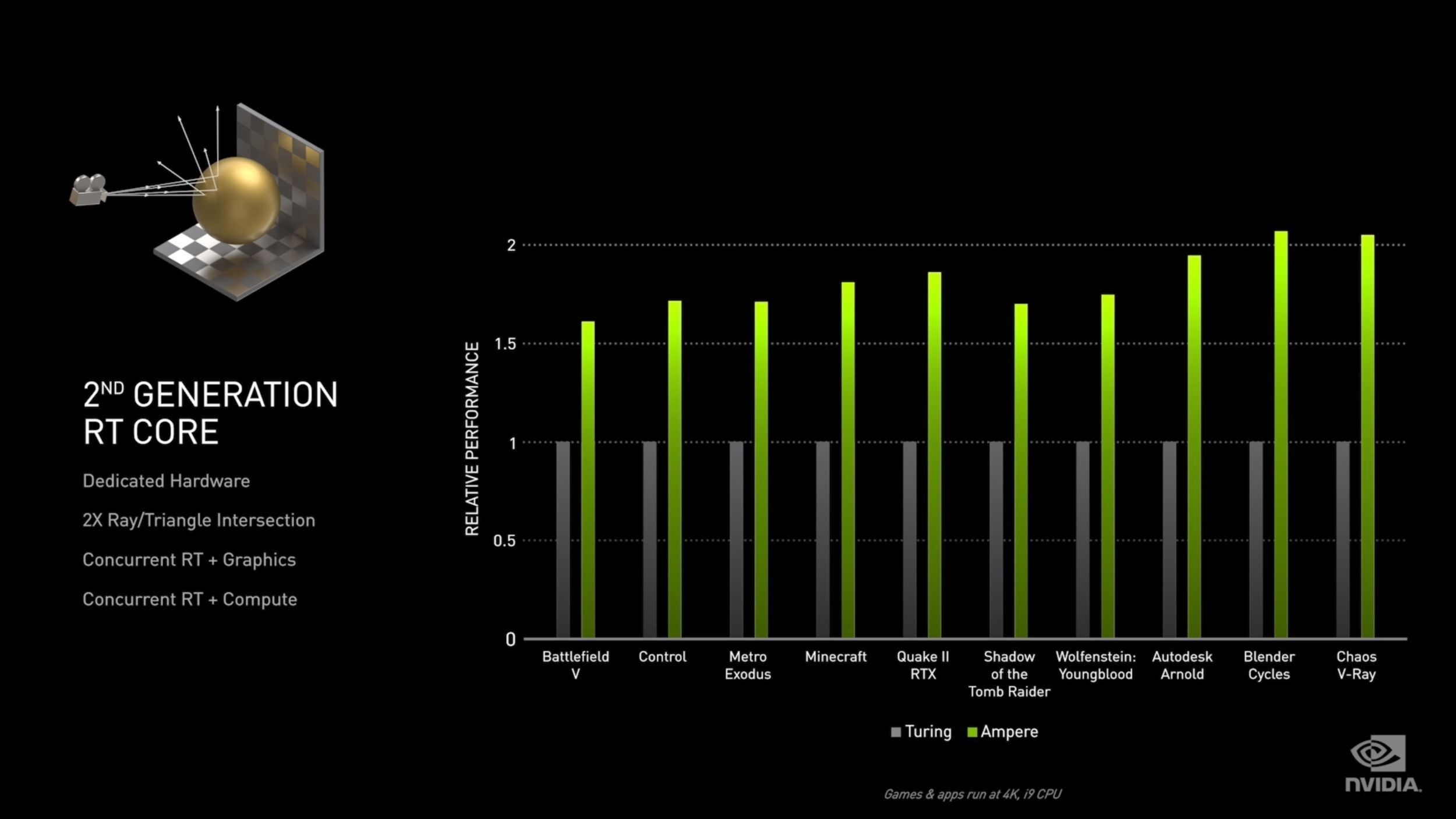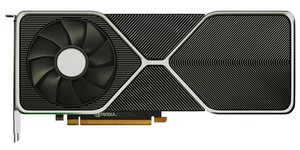Nvidia unveils RTX-30 series of GPUs and they're whoppers
September 2, 2020 | 11:00
Companies: #nvidia

Nvidia unveiled its long awaited RTX 30-series of graphics cards last night, and the improvements look to be massive.
In the grand unveiling, CEO Jensen Huang called the series of new cards "the greatest generational leap ever" for Nvidia's GeForce cards, and the numbers sound about right for that to be the case. The first three cards of the RTX 30 series were unveiled in the form of the RTX 3090, RTX 3080 and RTX 3070 with the RTX 3080 first to be released on September 17th with the RTX 3090 following on September 24th and the RTX 3070 arriving sometime in October.
The RTX 3090 is the biggest beast here and is expected to retail at £1,399. For the price, you get a huge upgrade compared to the likes of the RTX 2080 Ti with 10,496 CUDA cores (compared to the 2080 Ti's 4,352), a boost clock of 1.7GHz, 19.5Gbps GDDR6X, 384-bit memory bus width, and 24GB VRAM. It also promises 35.7 shader teraflops, 69 ray tracing TFLOPS, and 285 tensor TFLOPS. Beast is the right word here although Nvidia is going with referring to it as the BFGPU as a nice nod to everyone's favourite BFG weapon.
Significantly, the card is 8K-ready and promises to be the world's first GPU able to play games at 60fps in 8K resolution. It also implements a new 12-pin power connector along with an overhauled cooling system in the form of a three-slot, dual-axial, flow-through design that aims to keep it 10x quieter than something like the Titan RTX while also keeping the GPU up to 30 degrees cooler.

Given the ridiculous heft as well as price tag of the RTX 3090, this isn't going to be a graphics card for everyone. Instead, cast your eyes over the GeForce RTX 3080 which is more the card for gamers keen to upgrade.
That one offers 2x the performance of the RTX 2080 and will be priced at £649. It offers 8,704 CUDA cores, a boost clock of 1.71GHz, 19Gbps GDDR6X, 320-bit memory bus width and 10GB VRAM. It also promises 29.8 shader teraflops, 58 ray tracing TFLOPS, and 238 tensor TFLOPS. Nvidia considers it to be the "perfect mix of fast performance and cutting-edge capabilities" with Huang describing it as Nvidia's "new flagship GPU". It's designed for 4K gaming with the promise of delivering more than 60 fps at 4K resolution with RTX switched on.
If that's still too pricey for you, there's also the RTX 3070. Released in October, it'll have a price of £469. It's faster than the RTX 2080 Ti with 8GB of GDDR6 (notably, no GDDR6X) with 5,88 CUDA cores, boost clock of 1.73GHz, 8GB VRAM and 256-bit memory bus width. Expect 20.4 shader teraflops, 40 ray tracing TFLOPS, and 163 tensor TFLOPS.
Nvidia's thinking here is that it's far cheaper than the RTX 2080 Ti while also offering far superior performance meaning it hits the "sweet spot".

In the case of all these cards, they utilise the Ampere GPU architecture and also take the leap to 8nm process technology which is a step up from the 12nm process used in the RTX 20 series of GPUs. Nvidia reckons Ampere GPUs provide twice the energy efficiency of Turing while also being far superior in every other way. As always, there's a handy chart to show the differences.
The RTX 3080 and RTX 3090 also use GDDR6X memory which Nvidia claims can transmit twice as much data as traditional GDDR6 memory in the same amount of time. Understandably, all the GPUs require more power than the previous generation with the RTX 3090 drawing 350W, RTX 3080 drawing 320W and the RTX 3070 utilising 220W.
There were also software improvements announced including real-time ray tracing and DLSS 2.0 coming to Fortnite. More importantly, there's also the newly revealed Nvidia Reflex software which optimises the rendering pipeline in games so that it improves latency by up to 50 percent. We'll need to see more of it to see if this actually comes to fruition in general play but it could make a huge difference to avid online gamers and esports enthusiasts.
Pretty much every hardware manufacturer you can think of has announced related graphics cards for the coming 4-6 weeks. We'll have to wait and see how each performs. Either way, simply put, it's been a huge and potentially generation changing 24 hours for PC gaming.

MSI MPG Velox 100R Chassis Review
October 14 2021 | 15:04








Want to comment? Please log in.